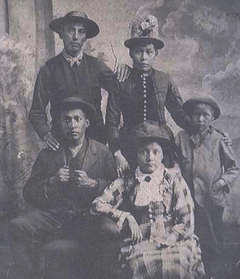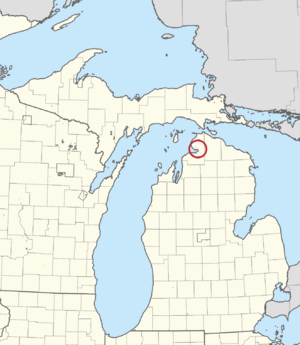Little Traverse Bay Bands of Odawa Indians facts for kids

1800s Odawa family, Little Traverse Bay Bands
|
|
| Total population | |
|---|---|
| 4,000+ | |
| Regions with significant populations | |
| Charlevoix and Emmet counties, Michigan, United States | |
| Languages | |
| Ojibwe (Ottawa dialect), English | |
| Related ethnic groups | |
| Ottawa, Ojibwe, Potawatomi and other Algonquian peoples |
The Little Traverse Bay Bands of Odawa Indians (LTBBOI, Ojibwe: Waganakising Odawa) is a federally recognized Native American tribe. This means the United States government officially recognizes them as a sovereign nation. They are part of the Odawa (also known as Ottawa) nation.
More than 4,000 tribal members live in their traditional homelands. These lands are located on the northwestern shores of Michigan's Lower Peninsula. The tribe's official reservation area covers about 336 square miles (870 square kilometers). This area is found in Charlevoix and Emmet counties.
Important communities within the reservation include Harbor Springs, where the tribal offices are located. Petoskey is home to the Odawa Casino Resort, which the Tribe operates. Charlevoix is another key community.
The Little Traverse Bay Bands of Odawa Indians is one of three federally recognized Odawa tribes in Michigan. Together, these tribes have over 9,000 members. Other Odawa groups with federal status include the Ottawa Tribe of Oklahoma and several First Nations in Ontario, Canada.
Contents
History of the Odawa People
The name Odawa (or Ottawa) comes from an Anishnaabe term meaning "trader." This name shows their historical role in trading goods.
Early Treaties and Land Agreements
The Little Traverse Bay Bands of Odawa are direct descendants of the Ottawa of L'Arbre Croche. This group signed important agreements with the United States government. These included the 1836 Treaty of Washington and one of the 1855 Treaties of Detroit.
Through these treaties, the Odawa gave up about 37% of Michigan's current land area to the United States. In return, they were promised money, land for reservations, and other benefits.
Challenges After the 1855 Treaty
The 1855 treaty divided tribal lands into 80-acre plots for individual families. This action weakened the tribal governments. It also created a new group called the Ottawa and Chippewa Nation, which included some Ojibwe people. Many of the payments and supplies promised by the federal government were never delivered.
In 1905, the Michigan Ottawa successfully sued the United States. They sought payment for fraud and broken treaty promises.
Working Towards Recognition
Throughout the 20th century, Odawa tribes in Michigan worked to get their tribal status back. They were encouraged by President Franklin D. Roosevelt's Indian New Deal. This included the Indian Reorganization Act of 1934, which helped Native Americans reorganize their governments. However, the Michigan Ottawa were initially prevented from organizing under this act.
In Michigan, several groups formed in the 1930s and 1940s to advocate for Native American rights. One important group was the Northern Michigan Ottawa Association (NMOA), formed in 1948. The Little Traverse Bay Bands of Odawa was known as NMOA, Unit 1.
NMOA, Unit 1 filed a lawsuit to protect their fishing rights, which were guaranteed by their 19th-century treaty. They argued that they had not given up these rights when they gave up control of their lands. However, the federal courts did not recognize NMOA Unit 1 as a tribe because it was seen as an organization, not a government.
Gaining Federal Recognition
Inspired by the success of the Grand Traverse Band of Ottawa and Chippewa Indians, who gained federal recognition in 1980, the Little Traverse bands reorganized. Their members created a constitution and set up their own government. They took the name 'Little Traverse Bay Bands of Odawa Indians.'
Even after reorganizing, a federal court still denied the tribe treaty fishing rights. The court said the tribe was not federally recognized and therefore had no standing under the treaties.
Because of their clear history of treaty relations with the federal government, the Little Traverse Bay tribe worked to have their tribal status officially confirmed by law. On September 21, 1994, President Bill Clinton signed Senate Bill 1357 into law. This law officially recognized the Little Traverse Bay Bands of Odawa Indians (and the Little River Band of Ottawa Indians) as sovereign nations.
Traditional Bands and Homeland
The tribe is made up of descendants from nine traditional Odawa bands who lived in this area:
- North Shore (from Naubinway west to Escanaba)
- The Beaver Islands
- Cross Village
- Burt Lake
- Good Heart (Middle Village)
- Harbor Springs
- Petoskey
- Bay Shore
- Charlevoix
Most tribal members still live in their traditional homeland. The reservation area covers about 336 square miles (870 square kilometers) in Charlevoix and Emmet counties. The main communities within the reservation are Harbor Springs, Petoskey (where the Odawa Casino Resort is), and Charlevoix.
Language and Culture
The Odawa language is a dialect of the Ojibwe language. While some tribal members speak Odawa as their first language, most primarily speak English.
The Tribe is working hard to bring back and preserve the Anishinaabe language and culture. They do this in many ways, including:
- Summer language camps
- Language classes at North Central Michigan College in Petoskey
- Community language classes
The Gijigowi Anishinaabemowin Language Department helps with language education from its main office in Harbor Springs.
Tribal Citizenship
The tribe decides who can be a citizen. To become a citizen, a person generally needs to have at least 1/4 North American Indian ancestry. They must also be a direct descendant of someone listed on specific historical records. These records include the Durant Roll (1907-1910) or the Annuity Rolls of Ottawa and Chippewa of Michigan (from 1836 to 1871). These individuals must also be mentioned in censuses from 1850 to 1920 as living within the reservation boundaries.
The Odawa and other Native American groups have traditional lands that are now split by the border between the United States and Canada. Because of this, the tribe requires citizens to have at least 1/4 North American Indian ancestry. They also must be direct descendants of people listed on the tribal records. People who are already enrolled in other tribes cannot become citizens of the Little Traverse Bay Bands.
The tribe also has special rules to help Native Americans who were adopted by non-Native families as children. These rules help them become citizens and reconnect with their heritage.
Little Traverse Bay Bands of Odawa Indians v. Whitmer
In August 2015, the tribe filed a lawsuit against the State of Michigan. The tribe claimed that Michigan had not kept its part of an 1855 agreement. The main question was whether the 1855 agreement created an "Indian reservation" in northwest Michigan. If it did, the next question was whether the U.S. Congress had ever changed that status.
Many cities, counties, and local groups joined the lawsuit against the tribe. These included the cities of Charlevoix, Petoskey, and Harbor Springs, as well as Emmet and Charlevoix counties.
In August 2019, a federal court ruled against the tribe. The court stated that after reviewing all the historical records, the 1855 treaty could not be understood to create an Indian reservation.
The tribe appealed this decision to the U.S. 6th Circuit Court of Appeals. In May 2021, the 6th Circuit Court also ruled against the tribe. It found that the 1855 Treaty did not create enough federal control to establish an Indian reservation for the Band.


